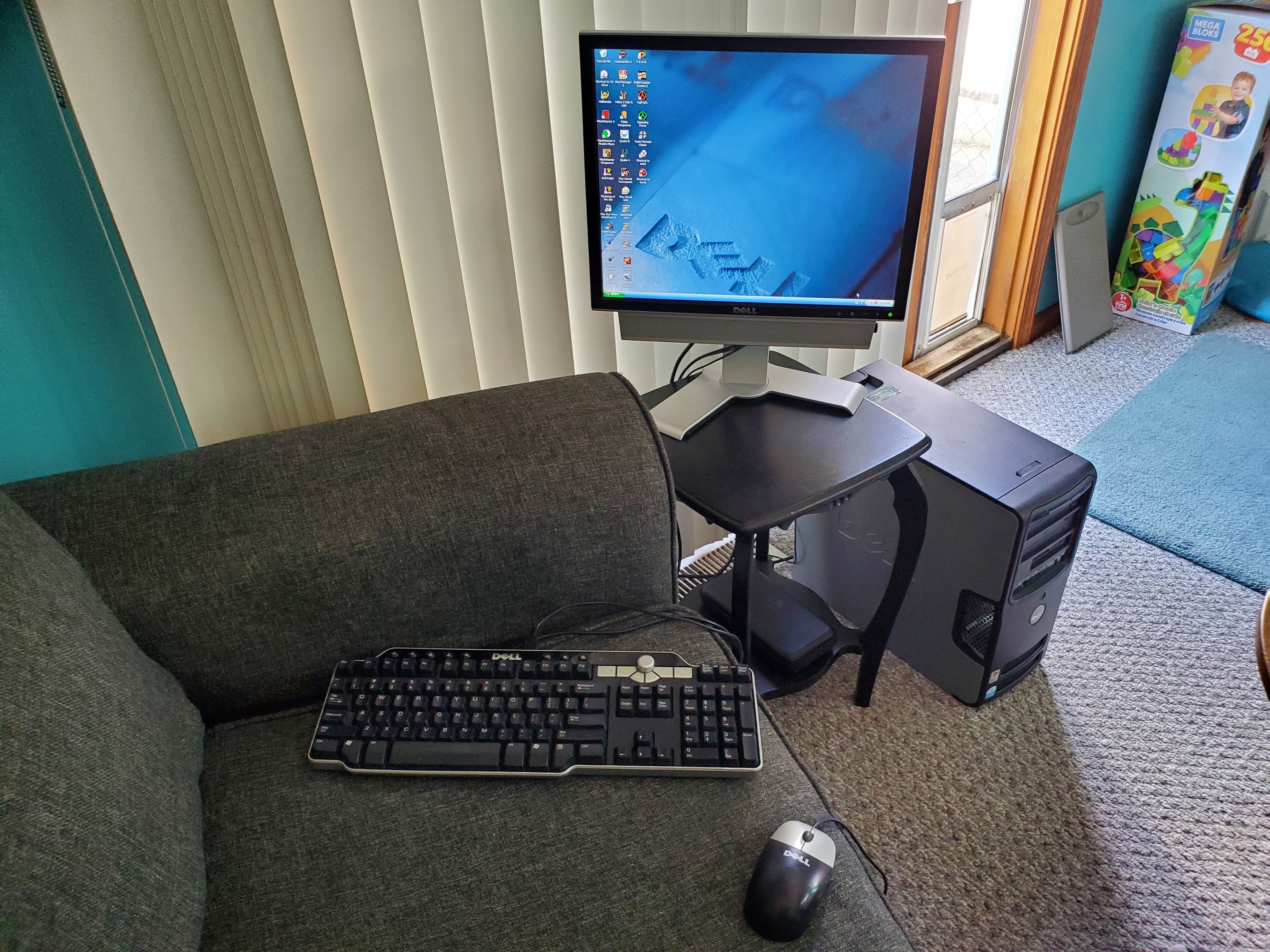They need to stop messing with things that work. Feature creep is how Windows XP turned into the dumpster fire it is today. Does the interface have a working file explorer? Does it support add-ons? Does it have a file search? You’re done.
"But . . . "
You’re DONE.
Windows XP is EOL…
deleted by creator
I really liked XP. I still have a machine running it.

Air gapped right?
Oh, yeah. I don’t even have the network adapter drivers installed.
Friendly reminder: before people liked XP, people hated XP. Much of the criticism that applied to Vista at launch also applied to XP. Guess which one is looked back at more fondly.
And I actually thought Vista was good. Leagues better than XP even. It served me well for 3 years. Now I don’t even use Windows anymore.
You can’t be against feature creep and for add-ons. Those two are entirely antithetical.
Not at all. OS should just be core functionality, all bells and whistles should be add-ons so they can be added, replaced, or done without if not needed.
That really depends on where you draw the line on what is “core functionality”. I’d consider a system tray to be core functionality, you apparently don’t.
Sure you can, because those are two different things. Feature creep applies to functionality that is there straight out the box. Add-ons are things that are built ontop of the out the box solution.
To put it in hardware, if you buy a PC then a PC is what you get out the box. If every PC had to come with a dedicated graphics card that would be a PC feature creep, because every PC doesn’t need a dedicated graphics card. However, that doesn’t mean you want mobo manufacturers to remove the PCIe slot, because you might want to add on (pun intended) a graphic card.
Just because I think something shouldn’t be in the baseline for everyone doesn’t mean I also don’t want to those things to be available for the people who do want those things in their system
I gonna be absolutely honest,gnome is fantastic for laptops.
Agree,It looks really nice on Laptops
Yes, everything (really, everything) just works, even on funky hardware like those tablet-pc things.
I use gnome too and I like it but that’s just not true. IME support (input of east Asian languages like Japanese) kind of sucks, especially as they only do ibus and not fcitx5.
Oh, I didn’t know about that. I luckily (for the purpose of using gnome and computers in general) only speak languages using the modern latin alphabet (and letters derived from it).
Why, did they add a “New Text Document” context menu option again?
Gnome users be like “Open in Terminal” > touch filename.txt
Can you not “just” add a “New Text Document.txt” template?
Why don’t they “just” add it for me so I don’t have to click it again to rename the file after it’s made?
I used arch btw with latest gnome on amd c60 brazos apu laptop and laptop with i7 4700mq and gtx850m and laptop with Ryzen 5700u apu, so far gestures only worked on ryzen apu, on any other laptop without Ryzen features don’t work and no amount of tinkering makes it work
My laptop has an 8th gen i5 and so far everything works(except my pipewire beig constantly broken).
i like gnome, it looks good, is smooth, and does it’s job
I’m happy with xfce4.
I can’t wait for Wayland support
same with Cinnamon (Not in Linux Mint)
Compiz, XFCE, and GNOME <40 (now Cinnamon and MATE) proved quality UI design 15+ years ago.
It is actually insulting to Linux desktop that the default DE on the top distros don’t even have minimize and expand buttons by default, and that any extra features require DE plugins.
GNOME 40+ is like Wayland. Years of development for practically no real user improvements. Every update shows off features DEs had over a decade ago.
GNOME 47’s first listed big change is accent colors. wtf??? What the f*** do you think we’ve been using GTK and Qt for???
At least with KDE, the ram usage is justified. GNOME eats system resources just to give you a shitty ChomeOS UI that feels just as cheap.
The moment XFCE ports to Wayland, I’ll happily swap Compiz for Wayfire and use my computer like a normal person.
most of the things in gnome extensions should be built in and available from the settings. that being said there’s nothing stopping me from just using something else, hence why I use kde.
What is the difference between adding a extension and enabling a setting other than that a disabled feature is just bloat?
I mean any distro can serve the extension it wants
extensions (in my testing, typically in a VM of fedora or openSUSE) are a pain in the ass to use. it’s also difficult to find the one that I’m looking for because there’s generally several with the same name. something like a system tray (iirc the extension is “app indicators”) or having the dock always visible on the desktop (idk what the extension is called) are features that most people who don’t already use gnome rely on to some degree. these things are core functionality of most desktops precisely because most people use and like these features, and adding a few of the most popular features won’t add enough extra data to really be bloat.
quick sidenote, while typing this I realized the way I have been phrasing things may sound a little aggressive. it's not meant to, this is meant to be more of a breakdown of why I think what I do about gnome as a desktop. I'm not sure how to rephrase this to be less aggressive, so I'm leaving this bit right where I noticed it instead.I personally am very big on having all the customization I can get (kde user, obviously) but I actually did almost stick with gnome once. I tried vanilla is because orchid has just come out and while I was messing with it I found out that it had the dock extension available by default (was new to Linux at the time and didn’t know how to actually use extensions yet) and with that dock extension I didn’t mind gnome as much. the thing with gnome is that it has a lot of good ideas but it ruins a lot of them by only half-implementing what everyone else is already doing. most people would probably find it a lot more usable if it just had features that have been standard since literally the beginning of GUIs, and used to be standard in gnome.
I don’t use GNOME, but from what I’ve read (and from experience with other software that has extensions) they often break when GNOME updates.
The features would break if they were built in.
GNOME has clear philosophy and they work for themselves, not for you so they decide what features they care to invest time and what features they don’t care about.
Having a standardised method for plugins is in my opinion good enough, nobody forces you to use extensions. And if you don’t want extensions to break, then wait till the extensions are ready prior updating GNOME.
The features would break if they were built in.
You can’t know that and I can’t imagine it would be true. If the plugins many folks find essential were incorporated into GNOME itself then they’d be updated where necessary as a matter of course in developing a new release.
GNOME has clear philosophy and they work for themselves, not for you so they decide what features they care to invest time and what features they don’t care about.
You’re not wrong! This is an arrogant and common take produced in poor taste though. A holdover from the elitism that continues to plague so many projects. Design philosophy leads UX decision making and the proper first goal for any good and functional design is user accessibility. This is not limited to accomodations we deem worthy of our attention.
Good artists set ego aside to better serve their art. Engineers must set pet peeves aside to better serve their projects. If what they find irksome gets in the way of their ability to build functionally better bridges, homes, and software then it isn’t reality which has failed to live up to the Engineer’s standards. This is where GNOME, and many other projects, fall short. Defenders standing stalwart on the technical correctness of a volunteer’s lack of obligation to those whose needs they ostensibly labor for does not induce rightness. It exposes the masturbatory nature of the facade.
Engineers have every right to bake in options catering to their pet peeves (even making them the defaults). That’s not the issue. When those opinions disallow addressing the accessibility needs of those who like and use what they’ve built there is no justification other than naked pride. This is foolish.
Having a standardised method for plugins is in my opinion good enough, nobody forces you to use extensions. And if you don’t want extensions to break, then wait till the extensions are ready prior updating GNOME.
I agree! Having a standardized method for plugins is good, however; the argument which follows misses the point. GNOME lucked into a good pole position as one of the default GNU/Linux DEs and has enjoyed the benefit of that exposure. Continuing to ignore obvious failures in method elsewhere while enshrining chosen paradigms of tool use as sacrosanct alienates users for whom those paradigms are neither resonant nor useful.
No one will force Engineers to use accessibility features they don’t need. Not needing them doesn’t justify refusing the build them. Not building them as able is an abdication of social responsibility. If an engineer does not believe they have any social responsibility then they shouldn’t participate in projects whose published design philosophy includes language such as:
Their walk isn’t matching their talk in a few areas and it is right and good to call them to task for it.
Post statement: This is coming from someone who drives Linux daily, mostly from the console, and prefers GNOME to KDE. All of the above is meant without vitriol or ire and sent in the spirit of progress and solidarity.
In a land where desktops can be ripped out and replace with ease - what’s the point in arguing? GNOME isn’t my thing but I’m glad it’s an option.
Mainly because gnome is harder to ignore than a lot of other opinionated DEs.
It’s been the default target for fedora and red hat, and like other choices rh makes, it propagates throughout the broader ecosystem.
Even if you ignore them, they dictate how Linux desktops are broadly allowed to work by largely asserting authority over FreeDesktop and by extension Wayland.
One of these is that they absolutely hate the concept of server side decorations, as a result even as they begrudgingly allowed it as a Wayland protocol, they insisted that it must not be mandatory and they are allowed to ignore it. This means applications that do not care about their decorations otherwise now must care about their decorations. As a user, the consequence is that any GTK application you might use is likely to just pop out as a gnome looking window among a bunch of otherwise consistent windows.
I avoid all of the modern gnome apps now as a result of this.
Even Windows allows the equivalent of server side decorations…
My main complaint with how Gnome does stuff is in environments where it is the only option (e.g. RHEL).
Which then is no longer an issue with GNOME but rather RHEL. But again, it’s not like we can’t figure out a way to install whatever in Hanna Montana’s dreams is allowed. 🤙
Can you swap out desktop environments in Linux like launchers on android?
Yes
Yeah pretty much. Or have multiple installed and pick which to use when you log in
Wait what?! Install several, pick upon login?! Had no idea, that’s awesome.
It will be goofy as the config files will still stick around between desktops.
I would runs desktop in a container or VM.
You can also mix login manager, window manager with desktop background managers, wallet managers etc…, in practice you can build your own desktop experience
I know the answer is “just build it” but man I want to be able to have adm<username login under something like nemo and a terminal window only. But then have username login under full Mint Cinnamon. Would be quite dope. Just don’t feel like making it happen at the moment. I’ll have to reconfigure permissions to revoke from my standard user.
Edit: oops you can comment out text in Lemmy?
Depends on your login flow. There is a session manager which normally boots up and let’s you choose. But you can also configure it to auto login and send you to the Lockscreen of your window manager.
Yes
It’s funny because GNOME was the first OSS X11 desktop environment to get actual usability testing from corporate developers (Sun Microsystems).
I’m not sure if they still have a user interface design guideline document, though. They probably burned it when GNOME 3 development started. Haven’t checked. I’ve mostly used Xfce since then (and very recently KDE).
I ended up switching to Gnome because KDE would always feel a bit jank to me. Something about it always feels slightly off, animations not working properly or being choppy like my desktop had an unstable framerate. Might just be it fighting with Nvidia, but I don’t have several hundred bucks lying around to upgrade my card and switch to AMD…
Kind of odd seeing the massive hate boner the community seems so have for Gnome, at least we have options for desktop environments at all.
I think the gnome haters are just the loudest. I’ve had all of the same issues with KDE and gnome has just always worked for me. Sure it’s not as customizable, but it gets the job done without annoying issues.
If you used Gnome back in the day you know there was a lot of that configurability built in. Then one day the developer decided to start taking it away. Slowly but surely all the ability to configure Gnome was removed. If you experienced this arc like I did you were left scratching your head.
Yes KDE was always more configurable, but removing what configurability Gnome did have made it less useful. For power users this is a big deal. It is like a company taking away all your features and thinking you are going to like it.
My problem with Gnome is the foundation itself.
They act like they know best, and rarely listen to user feedback.
They act like Apple, and that is very bad.
Not only that, but they also act like they are the default and only desktop on Linux, and rarely if ever cooperate with other desktop groups to make things work smoothly.
They are dragged kicking and screaming into following standards, and were the biggest source of NACKs (effectively a “veto”) on the Wayland protocol and a huge reason why Wayland still isn’t complete after over a decade of design.
The gnome desktop is pretty, but it is not functional. You can make it functional by installing gobs of extensions, but those extensions don’t follow a cohesive workflow concept, and often break with updates. It’s like trying to mod Skyrim or Minecraft.
To contrast that, KDE:
-
Explicitly listens to its users and has scheduled times for specifically taking in user feedback (within the scope of broad goals)
-
Actively works to be interoperable with other environments
-
Follows standards and pushes them forward
-
Has all the functionality out of the box, and can be made pretty with extensions/assets (the inverse of Gnome).
-
Functionality mostly doesnt break on updates unless it’s major (like switching to Wayland as the primary development target).
-
I don’t say much about it because it’s stupid to argue, but I’ve used a LOT of different desktop interfaces over the past 45+ years (yeah, really!), and GNOME…well, GNOME sucks. When Gnome3 was first released we all had high hopes for it improving on Gnome2 (which for those of us on Unix systems was a huge improvement over CDE), and instead it was buggy, clunky, awkward, and an enormous resource hog. Oh yeah, and it was massively unconfigurable. AND it continued to not improve for many many years, until most people I know switched to KDE or one of the other environments (MATE, Cinnamon, and xfce were very popular).
Gnome 4x added a touchscreen paradigm, whether you had a touchscreen or not, and made the experience worse in the process.
If you like it, great! Use it and love it all you want! I’ll play with it once every year or so just to see if someone has finally designed something that doesn’t suck so badly, but for a functional desktop, no thanks.
I think the fact that most of the ‘fringe’ desktops are well-known in the community because of people trying to escape GNOME is pretty telling.
Gnome x.x added a <whatever they got excited about lately> paradigm, whether you need it or not, and made the experience worse in the process.
There. The last couple decades of GNOME développement in a nutshell.
More like forcing no customization
You can change it up with gnome tweaks and extensions. By default you can set accent colors and the background. (Plus move apps around the dashboard)
But plugins break every update and gnome tweaks doesn’t let you change gnomes gtk theme anymore and from what I heard they added it in Gnome 3 bcs there was alot of drama
Extensions require time to be updated to support the newest gnome version. It is only any issue if you update right after the newest gnome release. It is better to stay on something stable anyway since you probably will find bugs in the latest and greatest.
As far a gnome tweaks is concerned it is still actively maintained and is needed for those who want to do more tweaking. It is important to note modern gnome is all libadwaita based which means it doesn’t use GTK themes. You can still set the theme for legacy apps but for libadwaita you need to set the colors you are looking for. The old style GTK is pretty much retired in gnome because it caused lots of inconsistent and non inclusive UI elements. Libadwaita makes everything the same and looks more modern than basically everything out there. (My opinion)
-
YEAH true I can see plugins being used on something like Debian.
-
Oh that’s why gnome tweaks got read of gtk theming I saw a forum post saying gnome devs don’t want customization especially they have this page: https://stopthemingmy.app/
I don’t want customization. The biggest users of gnome is probably enterprise Linux. In the enterprise or business space you want reliability and predictably.
Ok that would make sense why Most Enterprise oriented distros only ship Gnome
-
Gnome is amazing for laptops, the touchpad gestures are incredible, on PC it’s aight.
Gnome does some questionable things, and some are just personal preference, but there is at least one thing that they do that makes zero sense regardless of how you use your system…
The AppIndicator extension SHOULD be default. There is no reason for it to be an extension other than pure stubbornness. There are applications that literally require it in order to function at all.
I think the lack of a system tray in gnome is a case of perfect of being the enemy of good.
There’s a new Wayland protocol that probably will land in the next gnome release. The new protocol is supported by KDE and other desktops as well.
The reason that it was removed is because it is extremely hacky and bad. There have been talks within the project to just reads support since the extension got so many downloads but the new API is better anyway
Their solution to a problem is to pretend like it doesn’t exist simply because it will go away in the future? It’s a reason, but it isn’t a good one.
I won’t disagree with you there. They should’ve had a replacement before deprecating it. In there defense there was a alternative being developed but it ended up stalling over disagreements between KDE and gnome. The whole thing is a dumpster fire honestly. I’m glad they are cleaning it up. KDE and Gnome want the same thing for the most part they just kept getting into pointless bickering.
Would you mind providing a link or the name of the new protocol?
ext-tray-v1https://gitlab.freedesktop.org/wayland/wayland-protocols/-/merge_requests/355There’s no reason to expect GNOME to implement it, and I’m surprised they haven’t NACKed it.
It literally was developed by gnome. The merge request is coming from a gnome developer.
You don’t have to like gnome but it is silly to try to gate keep over it.
“I understand that some compositors have no interest in allowing clients to show arbitrary content in tray areas. GNOME, for example, doesn’t even have a tray area and it is my understanding that they believe that even the current SNI protocols allow clients too much freedom. Such compositors should not implement this protocol.”
–the page you’re referencing, by the creator of the protocol
Which I find to be a weird stance.
Gnome also believes that a window must have control over its own titlebar to draw it as it sees fit while simultaneously declaring it must not have control over a tray icon.
Also funny that Gnome seems to have objected to KDE proposal and wrote their own even though they seem to say point blank that while they are dictating how all the other DEs will do it, they themselves will be ignoring it. Why get in the business of a protocol you don’t even want to implement in the first place…
That you need an extension to disable the overview at startup still boggles my mind and the arrogance of the developers in the thread that started it didn’t lessen my antipathy for Gnome at all.
Why wouldn’t you want the overview at startup?
Because you already set firefox to autostart
In my case because I have my PC connected to the TV and Steam starting automatically in big screen mode. But according to the devs I’m doing it wrong and should get used to it because it’s the better experience when I can go and grab my keyboard to start typing the name of the program I want to start.
Because there is nothing to overwiew yet, obviously.
It provides easy access to search. I understand now though why you wouldn’t want it to open automatically (if you have startup programs you want to see instead).
actually, i just want to click one of my pinned panel favorites, but yeah, no need for search basically.
Default the cursor to the Search field on a Save dialog is possibly the absolute fucking stupidest thing ever.
I love GNOME and everytime I tried an other DE I came back to GNOME. But the cursor in the search field is annoying and incomprehensible…
I’ll be honest, I could probably use Gnome if I had to, with a few addons. But when I try it, the second I get to that dialog and it does that, I just shut it down and install something else. To me, it just epitomizes the contempt the developers have for the users, that it continues to exist after this long.
I’m triggered. Why would you even mention that.
Lets not be deliberately obtuse, you’re clearly meant to be using it with your feet.
Just the left foot only
TIL Gnome devs have (left) foot fetishism
Tarantignome
Every time I try kde I get pissed off that every time I make a settings change I have to hit apply as well. Gnome I just change the settings and close the window. Plus I can never figure out how to switch workspaces. I like super+scroll wheel or swiping on a laptop.
I like super+scroll wheel or swiping on a laptop.
Nevermind that you can configure it to do whatever you want. Swiping is literally the default in KDE.
It’s a pity that the dont improve touch experience. Especially floating touch keyboard situation - there is none (working well).
My only complain in (default PopOs/Gnome’s?) Dolphin file explorer there is no “space” to right click in the “current” directory… Otherwise IMHO it’s no worse than Windows!
That’s a pretty low bar!




















